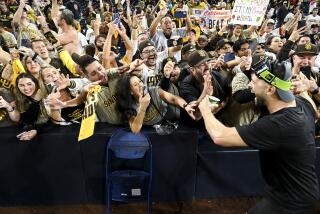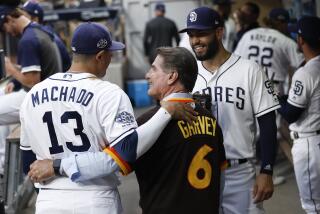Raiders-- Oakland Dreams of a Return
OAKLAND — The sign over the entrance to the bar of Ricky’s Sports Lounge in nearby San Leandro--a favorite watering hole of East Bay fans--has weathered in the seven years since the Oakland Raiders left for Los Angeles, but at least it is still there: “Welcome to Raider Land.”
And proprietor Ricky Ricardo Jr., like thousands of others in the blue-collar neighborhoods that surround the Oakland-Alameda County Coliseum, has by no means lost his hope that one day the Raiders will give up on Los Angeles and return to the city where they won so many championships and sold every seat at every football game 12 years in a row.
Didn’t Work in L.A.
“The Raiders left such a legacy of winning and being dynamic and being tough,” said Ricardo on a rainy afternoon not long ago, as he watched college basketball on some of the eight giant screens that adorn his lounge. “They tried to take it to Los Angeles, but it didn’t work. What happened to that meanness and toughness when they got there?”
In recent months, with the Raiders at loggerheads with authorities at the Los Angeles Memorial Coliseum, and facing many uncertainties as they strive to build a stadium in suburban Irwindale, belief in chances for a Raider return to Oakland has blossomed into an amazing popular movement.
The diary of this movement is a slick-looking paper called Sportspage News published by a 26-year-old Hayward print shop owner, Donald K. Maroney, during the football season. It is exclusively devoted to the Raiders and the cause of Oakland bidding for their return. Published on high-quality paper and featuring much more extensive coverage of Raider games than any regular newspaper, even in Los Angeles, it had an East Bay circulation last fall of 23,000 copies.
Davis and Black Ink
As the Raiders foundered their way toward what would turn out to be a 7-9 season, Maroney wrote hopefully: “If the Los Angeles version of the Silver and Black has one more losing season, it will mean sure death for the franchise in Southern California. Al Davis looks at one thing. Black ink. If the Raiders are losing money as an organization in L.A., then he might consider a once taboo subject. The move back to Oakland.”
Maroney and his friends circulated petitions demanding that the Oakland City Council, the Alameda County Board of Supervisors and the Oakland-Alameda County Coliseum Commission make a new offer to Raiders owner Davis. Forty thousand names were collected, and Maroney and his friends appeared before the various governing bodies and demanded action on a plan to entice the Raiders by agreeing to expand the stadium and build more luxury boxes.
Meanwhile, the Raiders showed up in the Bay Area to play a regular season game against the Super Bowl-champions-to-be San Francisco 49ers. The estimated 10,000 to 15,000 Raider fans who showed up frequently out-screamed the San Francisco fans. The Raiders won the game on a surge of emotion, 9-3.
Then came talk of a Raiders-Houston Oiler exhibition game next Aug. 26 in Oakland. Although plans for it remain tentative, boosters of the return-the-Raiders campaign predict confidently that if it does take place, they will be able to fill the 50,000-seat stadium, now principally the home of the Oakland A’s baseball team. Feeding all this enthusiasm is the fact that Raiders games last season were broadcast on one of the Bay Area’s leading news stations, KCBS San Francisco. Given all that attention, it was hardly surprising that sale of Raiders shirts and other paraphernalia in the East Bay soared.
A sparkling moment in the surge toward soliciting the Raiders’ return, the boosters felt, would come Feb. 16 when Davis was an invited speaker at the 10th annual installation dinner of the Bay Area Sports Hall of Fame. His role was to make a presentation speech for George Blanda, who spent the last nine years of an illustrious 27-year National Football League career as a quarterback with the Raiders and was being inducted that night into the Hall of Fame.
But the speech was something of an anticlimax. Davis, as he has right along in recent months, said not a word about the possibility of moving the team back to Oakland.
“He has had nothing to say on the subject,” said a Raiders team source last week. “It’s just not in the realm of things. There’s nothing really that’s been discussed about it.”
Confirmation of the lack of discussions came in an interview with the chairman of the Oakland-Alameda County Coliseum Commission, George Vukasin, who declared: “I do not know that the Raiders are an option for us. The Raiders have, I assume, a commitment to play in Irwindale. Certainly, seeking their return is not a primary objective of ours.”
At the same time, Vukasin noted that he has “a lot of respect” for Davis and that he personally had supported a deal that would have acceded to his demands for improvement of the stadium 10 years ago with the aim of keeping the Raiders playing in Oakland.
Vukasin is also one of the key members of a committee that is trying to pursue an NFL expansion team for Oakland.
“If anyone, including Al Davis, wants to talk to us, that’s fine,” he said. “But we will not initiate such discussions. We will not do what L.A. did to Oakland, which is to go to another city and try to obtain their franchise.”
Besides, said Vukasin, “Every year, people call and say they can put a deal together with the Raiders. Nothing has ever happened. And I think the worst thing we can do in Oakland is to concentrate on the Raiders and forget what should be our primary effort--to bring an NFL franchise. Then the NFL owners would say, ‘Oakland is out of the picture’ for an expansion team.”
The trouble with this line of reasoning, the Raiders boosters say, is that Oakland may be out of the picture for an expansion team anyway. The NFL has been vague about its plans for expansion in general and, with the retirement of Commissioner Pete Rozelle and the league’s festering players relations problems, it is presently on an indefinite hold.
Besides, other cities--such as Memphis, Birmingham, and Jacksonville--might prove more enticing candidates if the league does expand, especially since none of these cities have an NFL competitor like the 49ers just a few miles away.
Maroney suggests that maybe Vukasin and his friends on the Oakland/East Bay NFL Expansion Committee have a personal financial interest in forming a new franchise. Vukasin denies it, and the staff director of the expansion committee, Michael Golub, says the committee knows that a Raiders return would be popular.
“There’s no question, there was a love affair between Oakland and the Raiders,” Golub says. “They really reflected the city and its character like nothing I’ve ever seen.”
Actually, one of the acknowledged problems in Oakland’s expansion plans is that it has no one definitely in line to ante up the estimated $50 million to $100 million “entrance fee” the NFL is thought likely to charge any new franchise owner.
Getting the Raiders back would not entail paying any entrance fee, but there is general agreement that it would require spending up to $60 million to renovate the stadium. Vukasin notes that authorization exists to issue up to $100 million in tax exempt bonds for the stadium.
A 27-page proposal submitted recently to Oakland authorities by Maroney, civil engineer Ira B. Simmons and attorney Harry Bruno Jr., lays out a plan for luring the Raiders back to town. It includes a 65,000-seat stadium, 80 to 100 additional luxury boxes and construction of a new team headquarters and training facility as well as an Oakland Raider Hall of Fame.
“The Raiders’ slogan has always been “A Commitment to Excellence,” the proposal declared. “Let it be said that the Oakland Raider fan’s slogan is “A Commitment to Persistence.”
Despite their enthusiasm, the Raiders boosters freely acknowledge that, regardless of what they propose, Davis was difficult to deal with when he was in Oakland before, he has been difficult in Los Angeles, and he may not be easy to negotiate with again in Oakland, if negotiations do begin.
“Certainly, Al Davis is not Mr. Warmth,” Maroney remarks. “But he has a product this city needs.”
In a column written for his Sportspage News last November, Maroney suggested that Davis might start winning again if he returned to Oakland.
“Al Davis’ attentions have been directed in many other areas (i.e. Irwindale, lawsuits, L.A. Coliseum) all of which have nothing to do with winning games on the field,” he wrote. “Al needs to get back to the tasks which have made him the league’s most successful owner.”
Ricardo added in an interview: “We understand Al Davis. Everybody may not like what he did to us when he left. But we know he’s in business and went where he thought he had the best deal. That’s by the wayside. The Raiders are Al Davis and Al Davis is the Raiders. We know you can’t have one without the other.”
He also suggested that Davis really wouldn’t be his old winning self again until he brought his team back to Oakland.
“It just seemed that they lost their hunger when they moved down south,” he said. “They don’t have that killer instinct; they left that in Oakland. I can’t blame it on L.A. Maybe, there is just so much going on there that they lost their concentration. I just know they had it up here.”
More to Read
Go beyond the scoreboard
Get the latest on L.A.'s teams in the daily Sports Report newsletter.
You may occasionally receive promotional content from the Los Angeles Times.










